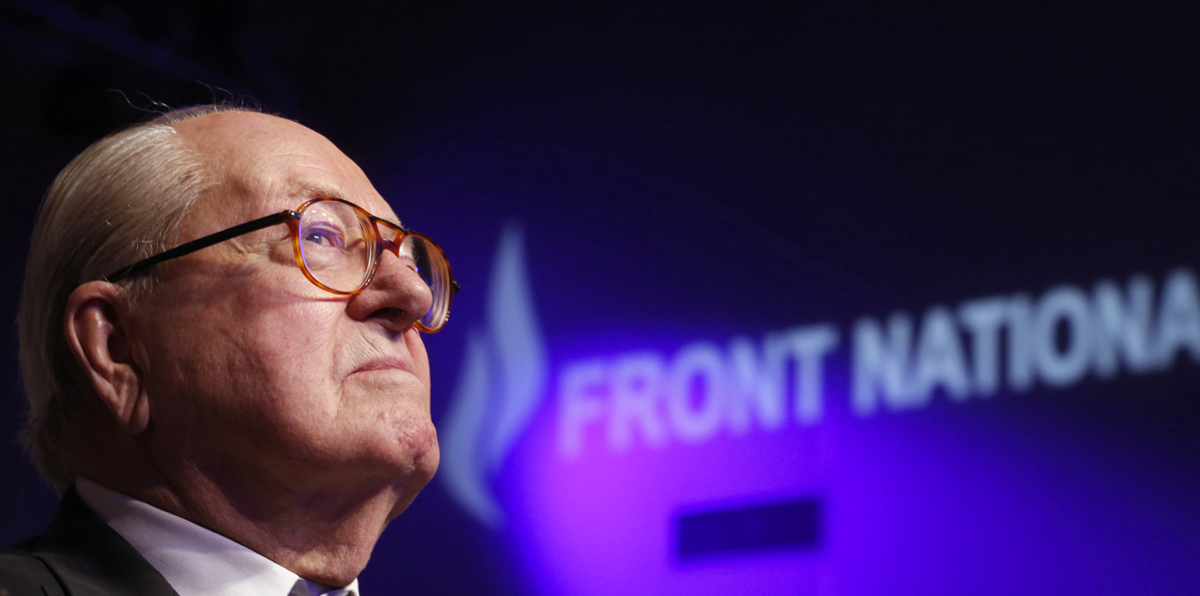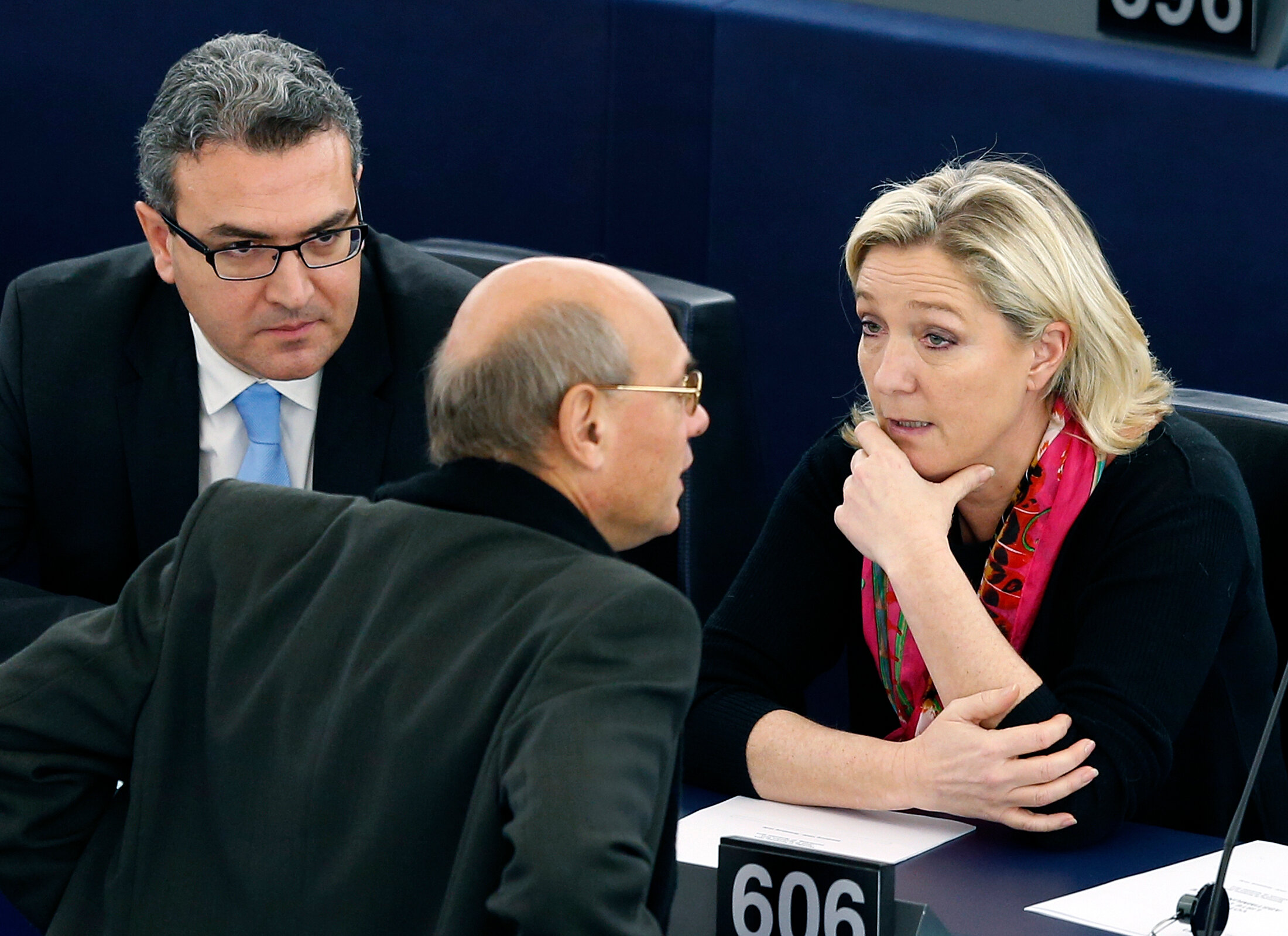The far-right Front National (FN) has received a third loan from a Russian lender, Mediapart can reveal. The party's founder and honorary life president Jean-Marie Le Pen has confirmed the existence of the additional borrowing by his so-called micro-party – an association whose role is to fund FN candidates in elections – without disclosing the exact source or the sum involved.
The news follows revelations by Mediapart of a 9 million euro loan to the Front National in September 2014 from the First Czech Russian Bank, and a 2 million euro loan in April 2014 to Jean-Marie Le Pen's micro-party from Vernonsia Holdings Ltd, which would be an offshoot of state Russian bank subsidiary VEB Capital. The beneficial owner of the lender on that deal would be Yuri Kudimov – information which M. Kudimov continues to challenge the veracity. He was expelled from London in 1985 for being a KGB spy and who until October was head of VEB Capital.
In an interview with Mediapart confirming the third Russian loan, Jean-Marie Le Pen said details of the sum involved remained “confidential information”. He said: “In all activities there's a need for discretion. I don't feel obliged to open myself up to my competitors and opponents.”
The micro-party involved in two of the Russian loans is a political funding association called Cotelec – a shortening of 'cotisation électorale' ('electoral contribution') – which has helped fund the Front National several times in recent years. Jean-Marie Le Pen showed Mediapart the first page of its first contract for 2 million euros, while keeping the rest of the contract confidential. “That's my problem, it's private,” he said during the interview on Wednesday, December 10th, in his office at the family property at Montretout in Saint-Cloud in the western suburbs of Paris. “It's a commercial document, I'm not obliged to disclose the ins and outs.”
Jean-Marie Le Pen refused to give the rate of interest or the repayment schedule of the initial 2 million euro loan. Nor did he indicate where it was signed. Marine Le Pen has also refused to give more details of the 9 million euro loan the FN received from First Czech Russian Bank, though she has sought to justify it by publishing five letters from French and Swiss banks who refused the party a loan.
However, the FN's founder Jean-Marie Le Pen did reveal the overall sums that he has sought in order to fully fund Cotelec, which he created in 1988 and of which he is president. “I don't hide from the issue of the loan, I am a borrower, and I can even tell you that I was borrowing 20 million [euros],” he said.

Enlargement : Illustration 1

Several leading FN figures have told Mediapart that they sent their Russian contacts requests concerning “finance estimated at 40 million euros needed between now and 2017”. Jean-Marie Le Pen says he has also carried out steps to ensure the funding of Cotelec, which in effect bankrolls the FN's election candidates. Le Pen does not dispute the Russian origins of the money he has borrowed. “The lenders have done an excellent deal financially - because they lent before the fall of the rouble they have already made a substantial profit, as their national currency has fallen in value while the loan was denominated in euros.”
The veteran far-right politician said that he had been seeking the “financial capacity” necessary for the coming election campaigns “which over the next two years include the départementales [editor's note, a département is broadly similar to a county], the regional elections, the presidential election and the parliamentary elections”. He added: “That represents well over 20 million euros.”
During the interview Jean-Marie Le Pen spelled out the role of his micro-party. “Cotelec is an organisation whose job is to borrow money to lend it to Front National candidates who stand at elections, and which can reimburse its creditors with the money that is paid back to it by the candidates, something which is not easy and not always certain [editor's note, candidates need to attract more than 5% of the vote to qualify to get around half of their campaign expenditure refunded by the state].” In a ruling in 2012 France's election finance watchdog the Commission Nationale des Comptes de Campagne et des Financements Politiques (CNCCFP) criticised the way Cotelec operated and did not allow Marine Le Pen's 2012 presidential election campaign to be reimbursed in respect of the interest due on Cotelec's loans to her – Cotelec had even billed for the administrative costs of the loans.
Jean-Marie Le Pen said that the départementale elections in March 2015 alone would involve 4,000 FN candidates. “There again, these are quite considerable sums that have to be lent, and have to be found,” he said. He also mentioned the party's plans to move to new headquarters, as it needs offices that “match its ambitions”.

Enlargement : Illustration 2

During the interview Le Pen also confirmed that Aymeric Chauprade, a FN Euro MP and Marine Le Pen's advisor on international affairs, had played a role in obtaining Cotelec's Russian funding. “Mr Chauprade put me in touch with people he knew,” said Le Pen. “It's through Chauprade that I met Konstantin Malofeev [editor's note, a Russian financier close to President Vladimir Putin]. You know how things work there, you have lunch, a dinner, someone says 'I know someone who can perhaps help you to find a loan'.”
On his last trip to Moscow, at the end of October 2014, Jean-Marie Le Pen indeed met the Russian financier at a lunch. Malofeev is founder of the investment fund Marshall Capital Partners and chairman of the Orthodox charity the St Basil the Great Charitable Foundation. Malofeev and Aymeric Chauprade have met on the latter’s foreign trips (see here and here) and the pair do not hide their friendship. Both men have links to right-wing French politician Philippe de Villiers, creator of the successful Puy de Fou theme park in west France. Konstantin Malofeev is working with De Villiers to create two history-based theme parks in Russia, one in Moscow and the other in Yalta. Chauprade, meanwhile, was the international advisor to De Villier's political party Mouvement pour la France (MPF) before joining Marine Le Pen's party. Malofeev's investment fund is also an investor in Russian telecoms giant Rostelcom, on whose board Yuri Kudimov sat until April 2014.
Aymeric Chauprade is the second MEP to get involved in the FN's search for Russian finance. It was Euro MP Jean-Luc Schaffhauser, once a consultant at French defence and aeronautical giant Dassault, who helped broker the party's 9 million euro loan with First Czech Russian Bank. Schaffhauser has admitted receiving 140,000 euros for his work, a sum that he did not disclose on his declaration of financial interests at the European Parliament.
According to Jean-Marie Le Pen, Chauprade also considered borrowing as an individual from his Russian contacts. “He wanted a personal loan and I advised him against it,” said Le Pen. “I told him, 'I advise you instead to borrow from Cotelec, to follow the common line, no exceptions.' We have an official and legal organisation. He went through Cotelec. He borrowed 400,000 euros. He has, incidentally, repaid his loan.” So Chauprade received funding from Cotelec, in return for the promise of Russian money to help fund Jean-Marie Le Pen's micro-party.
Aymeric Chauprade, who was on a trip to China, did not respond to Mediapart's questions. His press spokesman said that “all the [FN] candidates at the European elections borrowed from Cotelec”. The loan given to Chauprade had been signed in “December [2013] or January”. On November 28th the same spokesman had also stated that the MEP had “absolutely not been the intermediary” for Cotelec's 2 million euro Russian loan.
In anticipation of the European elections in May 2014 Chauprade had set up a funding association registered at the Le Pen family home at Montretout. As his treasurer he chose Marine Le Pen's sister Yann Maréchal-Le Pen and the association's president was Catherine Griset, a FN official and close friend of Marine Le Pen.
-----------------------------------------------------------------
- The French version of this article can be found here.
English version by Michael Streeter


